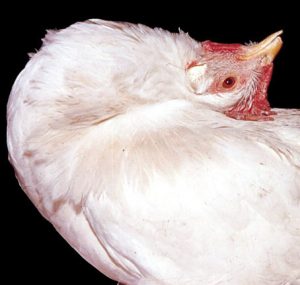
New Castle Disease Symptoms
Understanding Newcastle Disease in Poultry: Symptoms and Prevention
Poultry farming can be a rewarding venture, but it comes with its own share of challenges. One of the most serious threats to chicken farmers is Newcastle Disease, a highly contagious viral infection that affects chickens, ducks, turkeys, and other domestic birds. The disease spreads quickly and can cause massive losses if not detected and controlled early.
Knowing how to identify the symptoms of Newcastle disease and understanding how to prevent it are the first steps every farmer should take to protect their flock.
What Is Newcastle Disease?
Newcastle Disease is caused by a virus known as the Newcastle Disease Virus (NDV). It attacks the respiratory, digestive, and nervous systems of birds. The virus is spread through the air, contaminated feed and water, or direct contact with infected birds and their droppings. It can also spread through contaminated equipment, clothing, or visitors moving between farms.
The disease can occur at any time of the year, but outbreaks are more common during cold and windy seasons when birds are stressed and their immunity is low.
⚠️ Newcastle Disease Symptoms
The symptoms of Newcastle Disease vary depending on the strain of the virus and the health of the birds. However, most infected chickens show a combination of the following signs:
1. Respiratory Symptoms
Chickens may have difficulty breathing, cough, sneeze, or make wheezing sounds. You might notice nasal discharge or a watery discharge from the eyes. These are early signs that the disease has attacked the respiratory system.
2. Digestive Symptoms
Infected birds often produce greenish or watery diarrhea, which leads to dehydration and weakness. Their appetite drops sharply, and they appear dull and inactive.
3. Reproductive Symptoms
In layers, egg production decreases suddenly. The few eggs produced may have soft shells, rough surfaces, or irregular shapes.
4. Nervous System Symptoms
In severe cases, chickens may develop twisting of the neck (known as torticollis), paralysis of the wings or legs, or an unsteady walk. These signs show that the virus has reached the nervous system.
5. General Symptoms
Farmers may also observe birds huddling together, ruffled feathers, depression, or sudden death in large numbers. In some outbreaks, death can occur without any visible symptoms.
Recognising these Newcastle disease symptoms early gives farmers a chance to take immediate action to stop the spread.
Prevention of Newcastle Disease
There is currently no specific treatment for Newcastle Disease, which makes prevention the only effective way to protect your flock. Good farm management, vaccination, and strict hygiene are key.
Vaccination
Vaccination remains the most reliable method of preventing Newcastle Disease. Chicks should receive their first vaccine within the first week of life, followed by booster doses as recommended by a veterinary officer.
Here’s how to manage vaccination effectively:
-
Vaccinate regularly: Every three to four months depending on your local disease risk.
-
Use healthy birds: Never vaccinate sick or weak chickens.
-
Follow instructions carefully: Store vaccines properly, mix them as directed, and administer using clean equipment.
-
Methods of administration: Vaccines can be given through eye drops, drinking water, or spraying, depending on the type.
Vaccination works best when combined with strong biosecurity and good nutrition.
Biosecurity and Hygiene
Because the Newcastle virus spreads easily, strict hygiene and biosecurity are critical:
-
Isolate new birds: Keep newly purchased chickens separate for at least two weeks before mixing them with the main flock.
-
Limit access to the farm: Only allow essential workers in, and ensure everyone disinfects their shoes and hands before entering.
-
Clean and disinfect regularly: Wash feeders, drinkers, and housing equipment with disinfectant. Keep the chicken house dry and well-ventilated.
-
Dispose of dead birds safely: Bury or burn carcasses to avoid attracting scavengers or spreading infection.
-
Avoid mixing age groups: Keep chicks separate from adult birds to reduce the risk of transmission.
-
Report suspicious cases: If you notice sudden deaths or strange symptoms, alert your local animal health officer immediately.
Farm Management Practices
Healthy birds are more resistant to infections. Providing balanced nutrition, clean water, and proper housing helps birds develop strong immunity. Overcrowding should be avoided, as stress and poor ventilation make it easier for diseases to spread.
If an outbreak occurs, isolate sick birds immediately and stop movement in and out of the farm. After the outbreak is controlled, clean and disinfect the entire premises, and wait at least one month before introducing new birds.
Let's prevent Newcastle Disease
Newcastle Disease remains one of the most devastating poultry illnesses, but with proper awareness, early detection, and consistent prevention measures, farmers can avoid major losses. Recognising the symptoms of Newcastle disease early and applying good vaccination and biosecurity practices are the best ways to safeguard your flock.
Protecting your birds requires daily discipline — clean housing, controlled movement, and strict observation. When prevention becomes a habit, poultry farming becomes not just profitable, but sustainable.